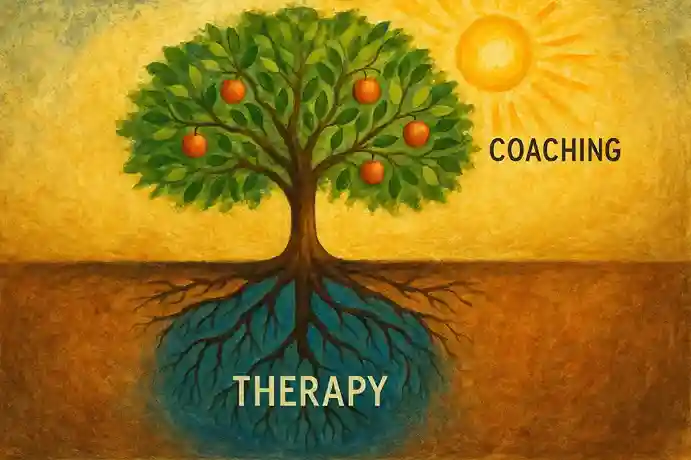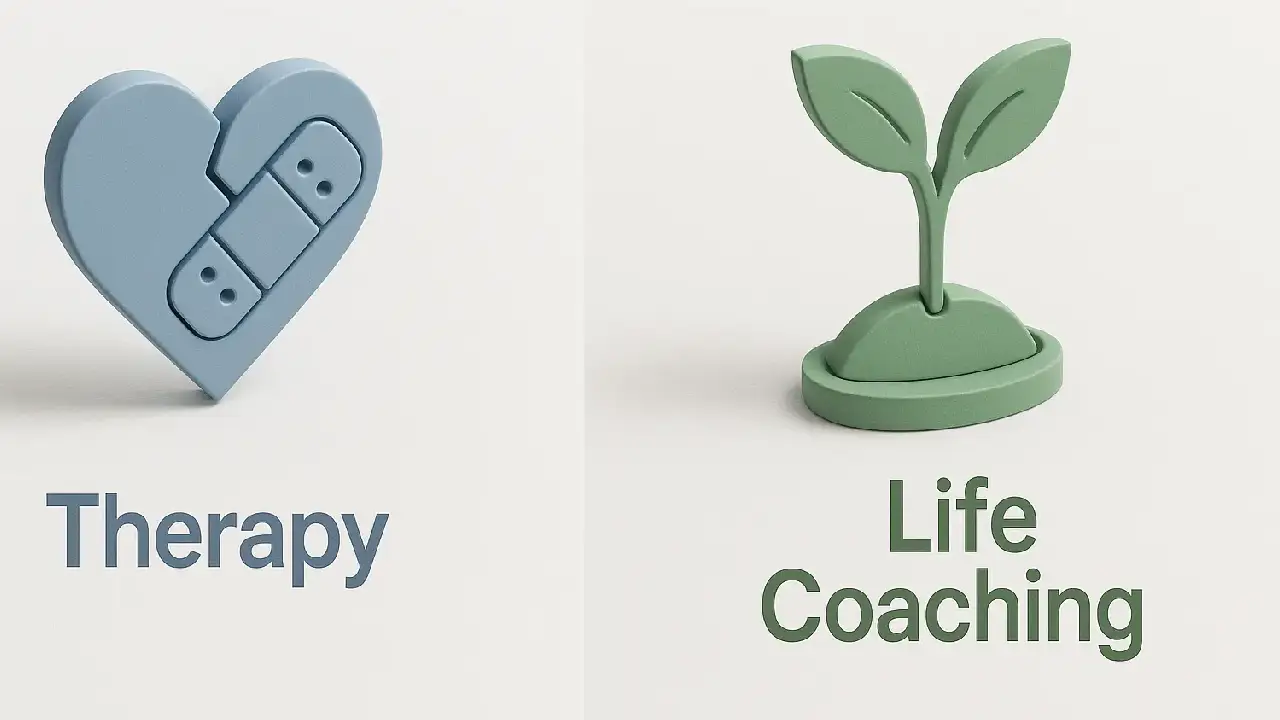If you feel stuck in life, whether personally and professionally, the decision to seek support is a courageous first step. Now comes the big question: life coaching vs therapy—which one will be better for you? From the outside, it might seem fuzzy. Both involve conversation, guidance, and self-improvement, but the methods, goals, and qualifications vary substantially. What you choose will matter because it will reflect upon your well-being, growth, and success in the future.
This guide will cut through the fog that surrounds it by laying out what is different between life coaches and therapists, when to seek therapy, when to seek coaching, and how the two may even complement one another.

Defining the Domains: Past vs. Future
One of the simplest ways to understand therapy vs coaching is to look at where they place their focus.
- Therapy (Counseling): Therapy usually aims to heal. It is an intervention that assists you in sorting out your past, trying to manage trauma, and resolving emotional or psychological problems that hinder your workability. Conversely, in cases of major depression, anxiety disorders, PTSD, or substance-use disorders, therapy is an indicated and required option. It often goes into the “why” of your troubles and also goes over how you are able to deal with them.
- Life Coaching: Coaching is all about moving forward. A coach helps you build a vision and translate it into goals and realistic steps toward achievement. It does not diagnose or treat mental illness but rather develops strategic options toward success. For instance, coaching can help you identify how to change careers, become a better leader, or create a better work-life balance.
Considering things this way: therapy repairs the damage while coaching builds the bridge.

Key Differences at a Glance
Here’s a side-by-side comparison to make the distinctions clearer:
| Factor | Therapy | Life Coaching |
| Primary Focus | Healing, mental health | Growth, performance, goals |
| Time Orientation | Explores the past | Looks toward the future |
| Credentials | Licensed clinicians (LCSW, PhD, LMFT, etc.) | Certification-based, not always licensed |
| Scope | Diagnoses and treats clinical disorders | Does not diagnose or treat illness |
When to Choose Therapy
If you are confused about therapy vs coaching for depression or anxiety, here is an ethical and significant rule of thumb: opt for therapy when mental health issues severely disrupt your life.
Therapy is the appropriate solution if you:
- are battling clinical depression that affects energy, motivation, and relationships.
- are dealing with anxiety disorders that disrupt work, social activity, or decision-making.
- are processing trauma (like PTSD) or grief that interferes with daily coping.
- Fighting addiction or compulsive habits that affect your health or relationships.
- Managing out-of-control emotions, thoughts, or behaviors.
Therapists are licensed and trained to manage these issues. They can offer treatment plans, evidence-based approaches, and in some instances, work with medical doctors on medication management.
Keep in mind: if you are suffering, heal first. Coaching might become useful later on, but therapy lays the groundwork.

When to Choose Life Coaching
Conversely, when your mental health is good but you need some sense of clarity, motivation, or structure, coaching would suit you. Life coaching vs personal growth therapy is not about repairing hurt so much as it’s about spurring forward momentum.
Coaching is a good choice if you:
- Need to navigate a career change or advancement.
- Would like to improve leadership and communication abilities.
- Achieve work-life balance without exhausting yourself.
- Want to set and maintain fitness, financial, or lifestyle objectives.
- Build self-confidence and a clearer sense of direction.
A coach will not treat or diagnose mental illness, but they can work with you to outline clear steps, keep you accountable, and guide your progress.

Can You Benefit from Both?
Yes. Both methods can be useful to people at different times—or even at the same time.
For instance:
- A therapist might assist you in dealing with child trauma that underlies your social anxiety.
- A coach can assist you in developing real-world skills to communicate confidently in meetings, network, and develop professionally.
This integrated system provides for your emotional health to be nurtured while you also work on real-world goals and development.

Conclusion: The Right Help for Your Journey
The bottom line is easy: therapy is for healing, coaching is for building. Both are strong in their own way, and the decision comes down to what you need right now.
If issues lie with mental health disorders, trauma, or emotional hurt, therapy is not only suggested—it’s necessary. If you’re in a pretty stable spot but are looking to develop, accomplish, and flourish, coaching might provide the guidance that will get you there.
Your path doesn’t have to be either/or. Most people find success blending both. The most important thing is to take the step toward support, because investing in yourself is the greatest investment of all.

Frequently Asked Questions
Q1. Can a life coach recommend a client to a therapist, or vice versa?
Yes. Ethical coaches will send clients to therapists if more profound mental health concerns are found, and therapists will suggest coaching when clients are ready for goal-directed change.
Q2. What specific licenses should I look for when choosing a therapist?
Seek out the following credentials: LCSW (Licensed Clinical Social Worker), LMFT (Licensed Marriage and Family Therapist), PhD, or PsyD in psychology.
Q3. What credentials should a reputable life coach have?
Although coaching is not regulated like therapy, a good coach may be certified by organizations like the International Coaching Federation (ICF).
Q4. How do the costs for life coaching generally compare to therapy sessions?
Coaching costs can be quite variable but frequently approach private therapy rates. Packages are sometimes provided instead of session-by-session charges.
Q5. What questions should I ask a potential therapist or coach in a first consultation to see if they’re right for me?
Inquire about their experience, modality, success stories, and the manner in which they typically organize sessions. The ideal candidate should feel safe, supported, and on track with your objectives.
Q6. Is it possible to see a therapist and a life coach simultaneously for various problems?
Yes. Lots of people do it—applying therapy to emotional recovery and coaching to career or personal planning.
Q7. What are the ethical boundaries that keep a life coach from venturing into mental health therapy?
Coaches are not trained to diagnose or treat mental illness. If emotional problems arise that extend beyond the goal-setting process, they ought ethically to refer the client to therapy.
Ready to Advance?
We at Emotional Ability Resources (EaR) want to direct you toward the best kind of help—whether in counseling, coaching, or both. Our aim is to help you bloom where feasible and to mend where required.
Contact us right now for a consultation if you are ready to learn the direction suited for your trip. We’ll collaborate to help you make an informed decision and purposefully move toward a stronger, more empowered you.


